Related Research Articles
Egoism is a philosophy concerned with the role of the self, or ego, as the motivation and goal of one's own action. Different theories of egoism encompass a range of disparate ideas and can generally be categorized into descriptive or normative forms. That is, they may be interested in either describing that people do act in self-interest or prescribing that they should. Other definitions of egoism may instead emphasise action according to one's will rather than one's self-interest, and furthermore posit that this is a truer sense of egoism.
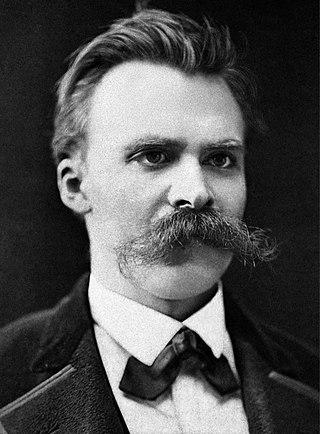
Friedrich Wilhelm Nietzsche was a German classical scholar, philosopher, and critic of culture, who became one of the most influential of all modern thinkers. He began his career as a classical philologist before turning to philosophy. In 1869 at the age of 24, he became the youngest person to hold the Chair of Classical Philology at the University of Basel in Switzerland. In 1879 he resigned due to health problems that plagued him most of his life, after which he completed much of his core writing in the following decade. In 1889 at age 44, he suffered a collapse and afterward a complete loss of his mental faculties, with paralysis and probably vascular dementia. He lived his remaining years in the care of his mother until her death in 1897, and then with his sister Elisabeth Förster-Nietzsche. Nietzsche died in 1900, after experiencing pneumonia and multiple strokes.

A duty is a commitment or expectation to perform some action in general or if certain circumstances arise. A duty may arise from a system of ethics or morality, especially in an honor culture. Many duties are created by law, sometimes including a codified punishment or liability for non-performance. Performing one's duty may require some sacrifice of self-interest.

Thus Spoke Zarathustra: A Book for All and None, also translated as Thus Spake Zarathustra, is a work of philosophical fiction written by German philosopher Friedrich Nietzsche; it was published in four volumes between 1883 and 1885. The protagonist is nominally the historical Zarathustra, more commonly called Zoroaster in the West.

Beyond Good and Evil: Prelude to a Philosophy of the Future is a book by philosopher Friedrich Nietzsche that covers ideas in his previous work Thus Spoke Zarathustra but with a more polemical approach. It was first published in 1886 under the publishing house C. G. Naumann of Leipzig at the author's own expense and first translated into English by Helen Zimmern, who was two years younger than Nietzsche and knew the author.
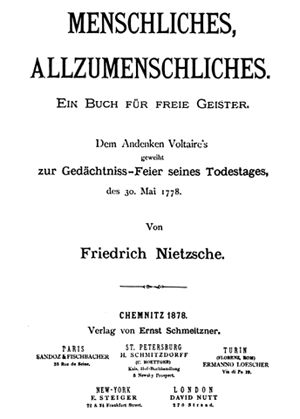
Human, All Too Human: A Book for Free Spirits is a book by 19th-century philosopher Friedrich Nietzsche, originally published in 1878. A second part, Assorted Opinions and Maxims, was published in 1879, and a third part, The Wanderer and his Shadow, followed in 1880.

The Antichrist is a book by the philosopher Friedrich Nietzsche, originally published in 1895.
The will to power is a concept in the philosophy of Friedrich Nietzsche. The will to power describes what Nietzsche may have believed to be the main driving force in humans. However, the concept was never systematically defined in Nietzsche's work, leaving its interpretation open to debate. Usage of the term by Nietzsche can be summarized as self-determination, the concept of actualizing one's will onto one's self or one's surroundings, and coincides heavily with egoism.
The Will to Power is a book of notes drawn from the literary remains of the philosopher Friedrich Nietzsche by his sister Elisabeth Förster-Nietzsche and Peter Gast. The title derived from a work that Nietzsche himself had considered writing. The work was first translated into English by Anthony M. Ludovici in 1910, and it has since seen several other translations and publications.
The fact–value distinction is a fundamental epistemological distinction described between:
- Statements of fact, which are based upon reason and observation, and examined via the empirical method.
- Statements of value, which encompass ethics and aesthetics, and are studied via axiology.

The Gay Science is a book by Friedrich Nietzsche published in 1882, and followed by a second edition in 1887 after the completion of Thus Spoke Zarathustra and Beyond Good and Evil. This substantial expansion includes the addition of a fifth book to the existing four books of The Gay Science, as well as an appendix of songs. It was described by Nietzsche as "the most personal of all my books", and contains more poems than any of his other works.
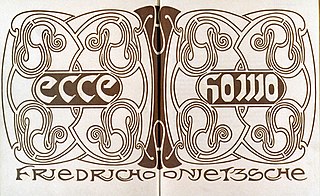
Ecce Homo: How One Becomes What One Is is the last original book written by philosopher Friedrich Nietzsche before his death in 1900. It was written in 1888 and was not published until 1908.

Friedrich Nietzsche (1844–1900) developed his philosophy during the late 19th century. He owed the awakening of his philosophical interest to reading Arthur Schopenhauer's Die Welt als Wille und Vorstellung and said that Schopenhauer was one of the few thinkers that he respected, dedicating to him his essay Schopenhauer als Erzieher, published in 1874 as one of his Untimely Meditations.
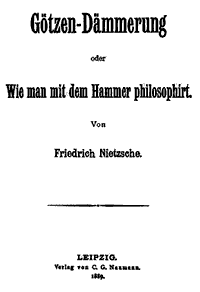
Twilight of the Idols, or, How to Philosophize with a Hammer is a book by Friedrich Nietzsche, written in 1888, and published in 1889.
The revaluation of all values or transvaluation of all values is a concept from the philosophy of Friedrich Nietzsche.
The 19th-century philosopher Friedrich Nietzsche is known as a critic of Judeo-Christian morality and religions in general. One of the arguments he raised against the truthfulness of these doctrines is that they are based upon the concept of free will, which, in his opinion, does not exist.
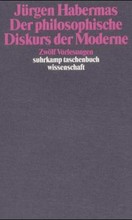
The Philosophical Discourse of Modernity: Twelve Lectures is a 1985 book by the philosopher Jürgen Habermas, in which the author reconstructs and deals in depth with a number of philosophical approaches to the critique of modern reason and the Enlightenment "project" since Georg Wilhelm Friedrich Hegel and Friedrich Nietzsche, including the work of 20th century philosophers Max Horkheimer, Theodor Adorno, Martin Heidegger, Michel Foucault, Jacques Derrida, Cornelius Castoriadis and Niklas Luhmann. The work is regarded as an important contribution to Frankfurt School critical theory. It has been characterized as a critical evaluation of the concept of world disclosure in modern philosophy.

On the Genealogy of Morality: A Polemic is an 1887 book by German philosopher Friedrich Nietzsche. It consists of a preface and three interrelated treatises that expand and follow through on concepts Nietzsche sketched out in Beyond Good and Evil (1886). The three treatises trace episodes in the evolution of moral concepts with a view to confronting "moral prejudices", specifically those of Christianity and Judaism.

Nietzsche: Philosopher, Psychologist, Antichrist is a book about the German philosopher Friedrich Nietzsche by the philosopher Walter Kaufmann. The book, first published by Princeton University Press, was influential and is considered a classic study. Kaufmann has been credited with helping to transform Nietzsche's reputation after World War II by dissociating him from Nazism, and making it possible for Nietzsche to be taken seriously as a philosopher. However, Kaufmann has been criticized for presenting Nietzsche as an existentialist, and for other details of his interpretation.
The Four Great Errors are four mistakes of human reason regarding causal relationships that the German philosopher Friedrich Nietzsche argues are the basis of all moral and religious propositions. Set forth in his book Twilight of the Idols, first published in 1889, these errors form the contrastive backdrop to his "revaluation of all values." Nietzsche wanted to liberate people from traditional moral and religious systems by denying the concept of "human accountability," which, he argues, is nothing more than an invention of theologians who wanted to exert power over other people. Unlike most religions and moral systems which hold that virtuous behavior results in happiness, Nietzsche argued the opposite. For Nietzsche, Internal psychological states that we cannot consciously control such as "happiness" are actually the true causes of virtuous behavior, not the human will.
